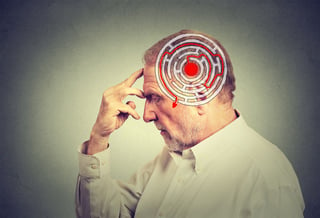
What Is (and Isn’t) Normal Aging
Updated from the original publication on May 18, 2017.
As we age, many of us will start to experience subtle changes in our body. Most of us might not want to admit it, but these changes are part of the normal aging process and are nothing to be ashamed of. There are, however, some changes that are not part of the normal aging process. If you start to notice those changes, you may want to consider taking action to protect your health.
What is Normal?
Many of the changes we go through are not necessarily harmful. You may have already noticed some of them, while others are going on behind the scenes. It’s also possible you might not go through the same changes as your friends or loved ones. Regardless, if you do notice the following changes, it’s usually nothing to worry about.
noticed some of them, while others are going on behind the scenes. It’s also possible you might not go through the same changes as your friends or loved ones. Regardless, if you do notice the following changes, it’s usually nothing to worry about.
Eyesight
As we age, the lenses in our eyes tend to get less flexible, which can negatively affect our vision. You might find you need glasses or contacts to help you see. Our peripheral vision and night vision also decreases.Hearing
It may be more difficult to hear tones and frequencies at extreme ends of the spectrum. Changes in tone and speech may also be harder to distinguish.
Hair
One of the most obvious (and most harmless) changes you’ll see is in your hair. You’ve probably already guessed it: your hair will start to turn gray if it hasn't already. It can also become thinner and your hairline may recede.
Skin
Your skin may start to heal slower, and your nails may grow slower. Your skin may also start to get dryer and you might notice more wrinkles.
Muscles
Muscle mass tends to decrease as we get older, making them smaller and you weaker. However, a good exercise regimen may be able to slow down the effects of old age on your muscles.
Bones
 Once we hit a certain age, the minerals in our bones start to disappear faster than we can replace them. This may lead to more fragile bones, and could even cause you to get shorter! Steps can be taken that might slow down the mineral loss, like regular exercise, getting enough calcium and vitamin D, and avoiding smoking. Talk to your doctor to determine the best course of action for you.
Once we hit a certain age, the minerals in our bones start to disappear faster than we can replace them. This may lead to more fragile bones, and could even cause you to get shorter! Steps can be taken that might slow down the mineral loss, like regular exercise, getting enough calcium and vitamin D, and avoiding smoking. Talk to your doctor to determine the best course of action for you.
Weight
Over time, your body weight may fluctuate. It will be different for everyone, but the general trend for most people is an increase in weight until middle age, where it remains relatively stable until old age, when it starts to decrease slightly. There are many factors that can positively or negatively affect your weight, like exercise and diet, so it’s very possible you won’t see this change exactly as described. Hormone changes may also result in a shift to more body fat and less muscle mass.
Metabolism
Our metabolism starts to slow down as we age. While this means we use less energy and need fewer calories, it could also mean medicines and alcohol are are not processed as quickly. Talk to your doctor to determine if an adjustment needs to be made to your medication.
Heart/Arteries
The heart naturally becomes less efficient as we age, meaning it may take more effort to pump blood through your arteries. At the same time, our arteries can become stiffer the older we get. Part of this is the natural buildup of plaque, which may lead to atherosclerosis. Because the heart is less efficient at pumping blood, you might notice a gradual decline in energy.
Brain
Starting around our 30s, the size of our neural networks, the blood flow to our brain, and  even the brain’s weight starts to decrease. The brain is incredibly resilient however, and is able to adapt to these changes. Although you still might notice you have trouble recalling certain details like names and dates as quickly as before. To keep your mind sharp, try to stay social and eat healthy.
even the brain’s weight starts to decrease. The brain is incredibly resilient however, and is able to adapt to these changes. Although you still might notice you have trouble recalling certain details like names and dates as quickly as before. To keep your mind sharp, try to stay social and eat healthy.
Sleep
Changes in our circadian rhythms, the cycle that determines how we sleep, are natural as we age. You might find yourself waking up more frequently during the night, and you might not sleep as long as you used to.
Sexual Health
The hormone levels in our body start to decrease around age 50. Men produce less sperm and women go through menopause.
What is NOT Normal?
While you’re more than likely going to experience some or all of the changes above, for the most part there’s nothing to get too alarmed about. However, if you start to notice signs of the following, you may want to consider talking to your doctor:
(This is not meant to be used as a diagnostic tool.)
Dementia
While changes to our brains are inevitable, dementia and Alzheimer’s disease go far beyond normal memory loss. With dementia, you may find it difficult to remember conversations that just took place, or you might not be able to remember the names of family members. You also might take frequent pauses or stop completely during a sentence. And sometimes you might not even notice anything is wrong, but your family may seem strangely worried about your memory. Talking to your doctor is the best way to determine if your memory loss is normal, or more serious.
Depression
Feeling tired or low on energy can be normal as we age, but if you constantly feel drained or sleep for most of the day, it could be a sign of something else. Depression has many symptoms and you might only show a fraction of them. If you or your loved ones think something may be wrong, consider talking to your doctor. If you are having suicidal thoughts, talk to your doctor immediately.
Insomnia
 Difficulty falling asleep is another change you may experience as a normal part of aging, but if it’s recurring or it takes you exceptionally long to fall asleep, it may be insomnia. Insomnia can include a variety of symptoms, including extreme difficulty falling or staying asleep, and not feeling well rested during the day. In very extreme cases, it’s possible to not sleep at all. Insomnia can be caused by several different factors, and treatment will depend on the cause. Talk to your doctor if you feel you may have insomnia.
Difficulty falling asleep is another change you may experience as a normal part of aging, but if it’s recurring or it takes you exceptionally long to fall asleep, it may be insomnia. Insomnia can include a variety of symptoms, including extreme difficulty falling or staying asleep, and not feeling well rested during the day. In very extreme cases, it’s possible to not sleep at all. Insomnia can be caused by several different factors, and treatment will depend on the cause. Talk to your doctor if you feel you may have insomnia.
Diabetes
Hormonal and metabolic changes are normal as we age, but diabetes is not. There are two main types of diabetes, each involving your body’s ability to produce the hormone insulin. Symptoms can include frequent urination and excessive thirst, unexplained weight loss, tingling/numbness in the hands and feet, and more. As always, talk to your doctor to determine if you have diabetes.
The normal changes that come with aging may be frightening, but they are nothing to worry about. It’s when you start to experience extremes that you may want to consider getting the opinion of your doctor. To learn more about how you can stay healthy, download our free eBook below.
About Presbyterian Senior Living
As the trusted leader in aging services, Presbyterian Senior Living combines over 97 years of experience with innovative approaches to senior communities and services. Across our 27 communities in PA, MD, OH, and DE, we serve over 6,000 seniors. We are committed to: FOSTERING teamwork and responsibility. UPHOLDING integrity in every action. EMBRACING innovation to create opportunities for everyone’s success. LEADING with compassion and respect.


